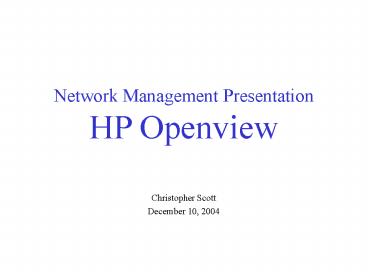Network Management Presentation HP Openview - PowerPoint PPT Presentation
Title:
Network Management Presentation HP Openview
Description:
Network Management Presentation HP Openview Christopher Scott December 10, 2004 OpenView Network Node Manager (NNM) OpenView Network Node Manager Overview How it ... – PowerPoint PPT presentation
Number of Views:232
Avg rating:3.0/5.0
Title: Network Management Presentation HP Openview
1
Network Management PresentationHP Openview
- Christopher Scott
- December 10, 2004
2
OpenView
- Network Node Manager
- (NNM)
3
OpenViewNetwork Node Manager
- Overview
- How it works
- Capabilities
- Technical and business benefits
- Summary
4
Network Node Manager
Overview
- Network management tool
- Proactive network management
- Provides a solid solution for managing dynamic IP
networks - NNM is starting point for implementing a network
management solution
5
What does it do?
- Dynamically maps out your network
- Collects critical information about you network
- Correlates the information it collect
- Maintains a relational database
- Provides report generation
6
How does it work?
- NNM uses several protocols to maintain
communication with each managed device - SNMPv1, SNMPv2
- TCP/IP, IPX
- UDP
- ICMP
- ARP/RARP
7
SNMP Network Mgmt Model
- Manager
- A manager is an application that executes network
management operations - The manager monitors and controls agent systems
- SNMP agent
- Resides on a managed node
- An application that acts on behalf of an object
- Object
- Anything that will be managed
- Host, router, hub, application, database
8
Manager-Agent Communication through SNMP
SNMP Request with Community Name
Retrieve (get) management information
Manager
Agent
MIB
SNMP Replies
Alter (set) management information
SNMP Traps
9
Automatic Discovery and Layout
- All IP and Level 2 devices on the network are
automatically discovered and mapped - IPX devices are also discovered
- Map is a logical representation of your network
- Automatic discovery may take several hours or
even overnight
10
Example of network discovery and layout
11
Network Discovery (contd)
- NNM discovers the following objects and put them
on the default map - Internet-level submap
- IP networks, gateways, routers and multihomed
workstations - Network-level submaps
- Bus, star and ring segments
- Segment-level submaps
- Hosts, gateways, routers, switches, hubs, and
bridges - Node-level submaps
- Network interface cards
12
Typical Submap Hierarchy
13
Distributed Internet Discovery and Monitoring
(DIDM)
- Large networks may require this distributed model
- Spreads discovery, monitoring, and polling across
several Network Node Managers acting as
collection stations - Collection stations monitor some portion of the
network and inform the management station of
changes
14
DIDM (contd)
- NNM
- can serve as a management station, a collection
station, or both - Management stations
- Role is to make the network management
functionality available to the users - Collection stations
- Role is to be a collection point in the overall
network management system
15
Simplified Distribution Model for NNM
16
Management Consoles
- NNM gives the ability to have 15 to 25 operators
simultaneously monitoring the network - Operators can share one map , or have individual
maps - Individual maps create area of responsibility on
the network for each operator - More efficient in large networks
17
Multiple Management Consoles
18
Sample map views
19
Sample map views
20
Sample map views
21
Challenges to IT Service Management
- User dissatisfaction / increased user
expectations - Deploying network services, while maintaining
productivity - Keeping networks and systems operational 24/7/365
- Producing faster, more predictable response times
- Integrating and managing complex systems in a
multi-vendor environment
22
Technical benefits
- Network Management can help achieve those goals
by - Fault and Problem Management
- Reduced downtime of network systems and devices
- Quick detection and correction of network
problems - Performance Management
- Ability to monitor data to anticipate problems
- Log information for historical analysis
23
Business Benefits
- Network Management can help achieve those goals
through - Accounting Management
- Obtains statistical information on network use
- Track individual resource utilization
- Security Management
- Protects the network and its systems from
unauthorized access, use, and harm
24
Summary
- hp OpenView NNM is a robust network management
platform that can provide a graphical look into
your network and provide many benefits like Fault
and Problem management, Performance management,
etc - Makes network management proactive instead of
reactive - NNM uses SNMP to discover devices on the network
and automatically manage and monitor them - NNM can play an integral role in achieving both
the technical and business goals of an
organization































